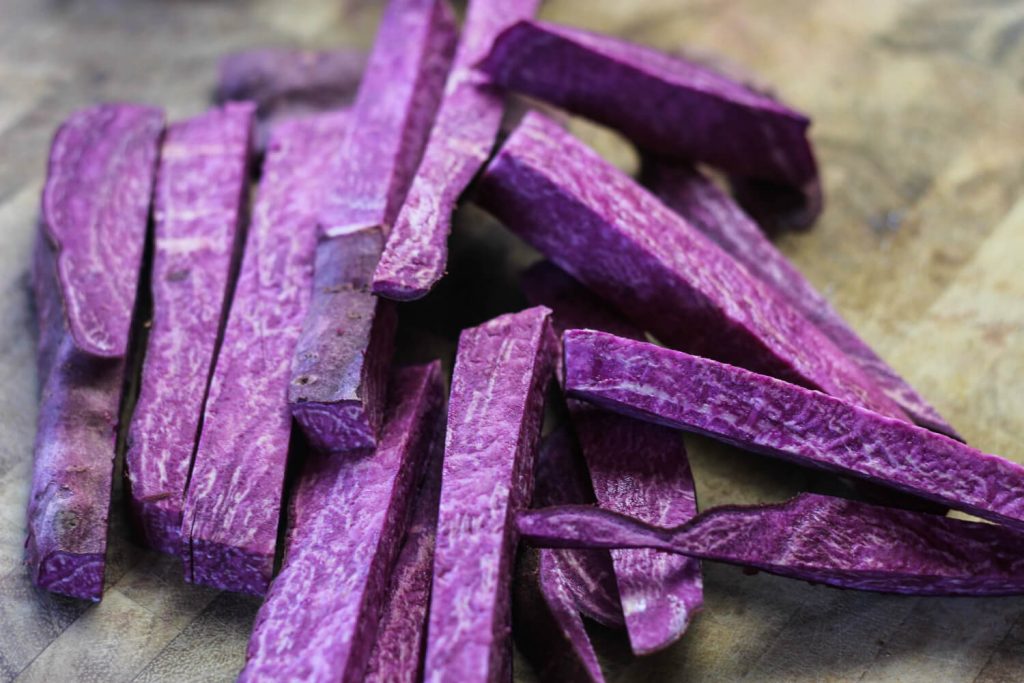The disease-combating effects of a plant based diet is already well documented within the progressive medical field, and the diet is even advised by a leading cancer support website.
Showing off the power of vegetables, a study at New Zealand’s Auckland University has suggested that eating purple-fleshed sweet potatoes reduces the risk of developing colon cancer by a staggering 75%.
Dr. Khalid Asadi, an Iraqi/Kiwi researcher, discovered the purple variety of this sweet root vegetable could prevent colorectal cancer when fed in various forms to mice. Another recent study uncovered that a vegan diet can cure cancer in mice.
This research was completed a decade ago, but due to commercial sensitivity, Asadi has only now been able to publish these results in the Journal of Cancer Prevention. The data collected was done through animal testing, which is not supported by many people who describe it as ‘cruel and outdated‘. Cruelty-free medical testing alternatives exist and many large organizations, including The Physicians Committee for Responsible Medicine, believe we should use these methods instead.

Asadi’s findings show that after feeding three generations of mice (who were bred to specifically have colon cancer) purple sweet potato, the number of polyps (abnormal growths within tissue that can be cancerous) present in the mice was reduced by up to 75%, within the same mice gene that is responsible for cancer in humans.
The three groups of mice were fed purple sweet potato in different forms. Some were given the vegetable’s nutrient-dense skin, some merely the sweet flesh and others a high concentration extract, rich in anthocyanin (a compound belonging to the flavonoid family which has great antioxidant and anti-inflammatory properties.)
As concentrated amounts of food and extracts deliver a higher nutrient profile the group fed the concentrated extract of sweet potatoes experienced the most significant impact on their polyps; 75%.

While these trials are yet to be conducted in humans, Dr. Khalid’s scientific findings are highly suggestive that the same, or very similar results would be shown in humans too – it is the same gene he studied after all.
However, for humans to receive the cancer-fighting benefits of this powerful vegetable, they would need to eat 1kg (2.2 lb) or more every day, something that Dr. Khalid recognises as “too hard” but not unachievable. He adds, “the concentrated extract used in the study would also be an easy way for people to get all the benefits of kumara and said the powder could eventually be put into tablets.”

Purple sweet potato isn’t the only plant-based food that has been shown to reduce the risk of colon cancer. Following a whole food plant-based diet has been proven to reduce an individual’s risk of all types of cancer.
In addition to this, Australia promoted ‘Meat Free Week‘ this September in order to address the growing prevalence of bowel cancer in the country. This is due to the fact that ‘The World Cancer Research Fund found that the risk of bowel cancer increases by 17% per 100g of red meat consumed each day and that risk of bowel cancer increases by 18% per 50g of processed meat consumed per day.’
In Asadi’s home country of New Zealand, bowel cancer is the second highest cause of cancer-related death, with over 1000 New Zealander’s dying from colorectal cancer each year and three times that amount being diagnosed. In comparison, colorectal cancer is the third most prevalent strain of cancer worldwide.
If tests are performed on human colorectal cancer patients showed similar results to Asadi’s mice tests, it is possible that human fatalities from this cancer could be reduced dramatically.
Note: The terms ‘bowel’, ‘colon’ and ‘colorectal’ cancer all refer to the same form of cancer and are used interchangeably.
Image credit: Pilot Fitness | draxe


